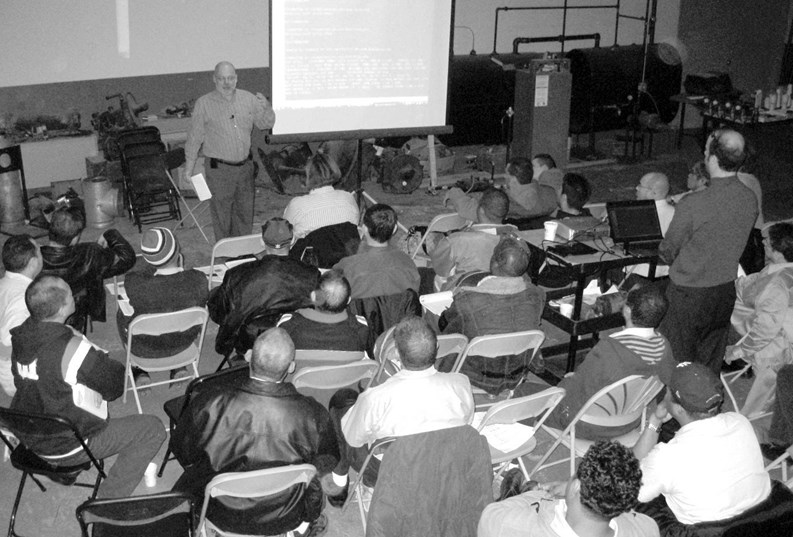When you’re a superintendent or a member of a building’s support staff, your educational background is not always that important when you’re hired, as long as your experience is enough to impress those doing the hiring. But once you do have the job, most industry professionals suggest that continuing your education is an important step in continuing to be successful.
Someone hired 20, 10 or even as little as five years ago has seen many technological advancements and the evolution of building systems and practices. To keep a building running smoothly and efficiently, it’s vital that building staff members keep their skills current in order to keep pace. Luckily, there are numerous options for furthering one’s education in New York that will help supers, handypersons, and other building staff members learn new skills, use new technology, and improve their overall work performance.
Courses Abound
“Education never hurts anyone,” says Curt Bergeest, vice president of the New York Superintendents Technical Association (STA). “If you are a porter or doorman and you want to move up and become a superintendent, you are going to have to go through certain stages. But even if you just want to learn some skills or improve some things so you can help your building, there are numerous classes available to help.”
There is no shortage of classes and certification courses offered throughout the city. Everything from air pollution control to standpipe and sprinkler systems to fire safety director certifications to greening buildings are taught along with basic principles of building maintenance.
According to Linda Nelson, director of the Local 32BJ Thomas Shortman Training Fund—the Service Employees International Union (SEIU) educational training and professional development program—three types of courses are offered for their union workers—categorized as industry, computer and academic.
“The most requested courses are those that are industry-based, such as electric basics, plumbing basics, air conditioning and refrigeration and heating systems,” she says. “Members see these type of classes as a gateway to career advancement.”
With approximately 8,000 to 10,000 enrollments per year at over 15 locations, the Shortman Fund offers over 100 courses and seminars to eligible members to help them advance their career in the building service industry.
The New York Association of Realty Managers (NYARM) also offers a selection of classes on property management designed to assist managers and building staff in furthering their careers, helping workers to develop and sharpen their skills and receive certification in important areas.
“We like to think of the excitement one feels as they thumb through the catalogue, just like one in college feeling the excitement and possibilities,” says Margie Russell, executive director of NYARM. “We try to distribute our catalogues so all the managers and building staff can see one, and we try hard to get the word out to everyone.”
Many building managers actively work with their workers encouraging them to further themselves and improve their skills by attending classes.
“These classes don’t just teach mechanical aspects, but building management skills,” Russell says. “The leadership pipeline starts with a porter or doorman wanting to take a management course, as many of them are aspiring to become a super or manager. It takes a lot of wherewithal to start the process because you know it will be many years down the line from when you take the first management course to when you actually have the responsibility in the building—but it’s an important first step.”
The STA also offers a variety of classes, and Bergeest stresses that you don’t need to be a super or a manager to improve your skills and knowledge.
“Classes are for everyone,” he says. “They’re for porters, handymen, doormen, supers, resident managers, property managers, board members. The majority of people attending classes are looking to move up, but I think a lot of them are looking to see what’s out there, and what kind of things they can do to help their building and save them money.”
STA, for example, offers coursework on lead paint, plumbing systems, mechanical systems, electrical systems, codes and even classes directed at personal skills. Other courses cover the less-concrete aspects of working in a multifamily residential building.
“The most important part of hiring someone for a superintendent are people skills,” says Peter Grech, STA’s director of education. “The trade skills in carpentry, electrical and HVAC are really secondary. With the changing times, most building issues are people-related, from the staff to the residents.” In addition to all the hardware, the STA also offers classes in tact and dealing with people. “Having trade skills when most of the issues are people-related will not help,” says Grech, “so these classes are designed for that part of the job.”
The STA currently offers classes in tact and ethics so workers can hone their powers of diplomacy and polish their interpersonal skills, Bergeest says. “Those are the type of things that can help you in your future and create for the building a more professional atmosphere.”
Money Matters
For those wanting to take classes, the cost of the courses is not usually a concern as many of the classes are free, paid for by unions or buildings, and some even allow applicants to qualify for free tuition. Those that do cost money are minimal.
“There is no cost to the person taking classes and it’s funded primarily by contributions from owners,” says Russell of the NYARM classes. “The amount of money spent on education is a very small amount per employee per year. The benefit is paid for out of contributions of management.”
The same holds true for the union workers.
“The training program is a joint labor/ management partnership,” Nelson says. “The program is supported by contributions to the fund negotiated between Local 32BJ and contributingemployers. Training is offered at no cost to eligible members only.”
With the STA, there are also a few options. “You can qualify for some classes—the state pays for it then,” says Bergeest. “Workers pay for some, but we make them very feasible so everyone can afford them.”
Some superintendent associations also have programs to enhance its member knowledge which fees are paid as part of the membership.
The Have-Tos
There are some legally-mandated courses that building staff members must take because of state law. These classes are offered year-round and are usually associated with certification requirements associated with boilers, safety or different operational systems.
“There are a few city and state regulatory requirements that building supers and staff must meet,” Nelson says. “The more important ones are Air Pollution Control, Standpipe and Sprinkler Systems, Fire Safety Director, Refrigeration License (Building Engineer) certifications and HPD superintendent requirements.”
NYARM also offers an eight-hour course covering safe lead paint practices.
Green is In
Some of the more popular classes that building workers are interested in these days are anything and everything to do with the environmentally friendly, “green” movement.
“Green training is especially critical right now. Inefficient building systems waste money and damage our environment unnecessarily,” Nelson says. “In the midst of this economic crisis we are paying a price we simply cannot afford. By greening our city’s buildings we can reduce our fossil fuel consumption and make our city a more affordable place to live.”
The Green Building curriculum offered by Local 32BJ includes topics such as water conservation, green cleaning, building control and operations, on-site energy audit, recycling, green roofs, renewable energy and retro-commissioning.
The STA is offering its first green class this summer and is expecting it to be very popular. “We have some exciting green classes coming up that will teach a lot about the methods and practices of using green techniques to help a building,” says Bergeest. “We are working with a New York company called Solar One to see what sort of benefits and incentive plans building superintendents can get for their buildings.”
Final Thoughts
Because a number of buildings have small staffs, some workers who are educating themselves for advancement may not be able to find the positions they want in their existing building. Chances are the next step for many of them would be in a different company. Even so, most buildings still encourage their workers to take classes, even if it means seeing them leave in the future.
“The building’s management and ownership allow and reward staff members to take classes on company time. That has a level of dedication,” Russell says. “If we are going to let you do this, it’s sort of a handshake agreement that they will be around for a while to benefit the building. It benefits both the employee and the building.”
Russell says that NYARM is always willing to help if someone is looking to further their education in the field. “Completion of this program along with appropriate on-the-job experience, successful completion of this series of courses and seminars can help members access the next rung on the career ladder,” she says, “and that’s important to everyone.”
Keith Loria is a freelance writer and a frequent contributor to The Cooperator.







Leave a Comment